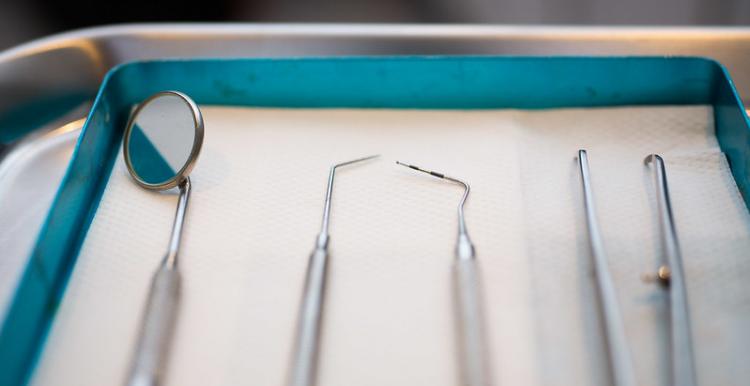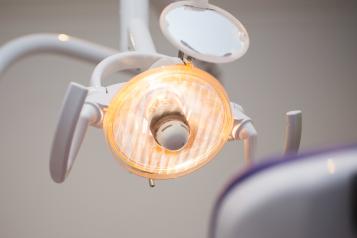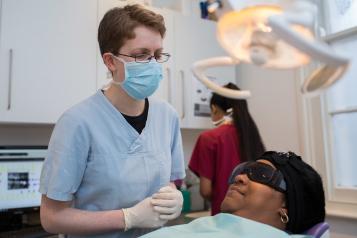NHS dentistry and Covid-19 update - November 2021

"As restrictions are eased and recovery continues, we are working towards restoring NHS dental services to pre-pandemic levels, increasing contracted activity thresholds and commissioning additional capacity in those areas facing the most pressures.
It is still the case that dental teams continue to face challenges due to the specific infection prevention and control measures essential to ensure the safety of patients and staff. Requirements for social distancing as well as ventilation and cleaning between patients remain in place.
Levels of NHS dental activity in the Midlands have risen safely and significantly but, as practices can see fewer patients on a daily basis, we are not yet able to offer a dental service equal to the care experienced before the pandemic.
In line with dentistry’s standard operating procedure, dentists are continuing to prioritise patients with the highest need or priority, such as those needing urgent care, children and those most at risk of oral disease. Although the situation is improving there remains a significant backlog of people who will not have seen a dentist recently. We have reminded dentists to be alert to any symptoms of additional oral problems when seeing patients.
We understand the frustration of patients who may be facing longer waits for routine care, especially as they can now see other areas of society becoming less restricted. We are clear that this is never an excuse for incivility or aggression. The NHS has a zero-tolerance approach to abuse and violence against its staff.
It is a condition of the practice’s income that they prioritise all patients who are known and unknown to the practice who require urgent dental care if contacted directly or via 111 services.
Safely restoring access
Our focus remains to support dentists and their teams in seeing as many patients as safely possible. Infection prevention and control means a return to normal practice is not yet possible, but nationally the contractual threshold of activity has been increased, and practices are now required to manage a minimum of 65 percent of pre Covid-19 dental activity, and a minimum of 85 percent of pre Covid-19 orthodontic activity. This will provide access for more patients whilst ensuring that the practices are supported financially to allow them to stay open and continue providing care.
We expect these measures to be in place until the end of December 2021 when they will be reassessed.
Access to a dentist
We often receive enquiries asking how people can register with a dentist.
It is not necessary to register with a dentist. Unlike GPs, you do not have to be on a dentist’s list and can move to dentists that are more convenient or who have been recommended. There is no formal registration although a practice may choose to accept you on to a list to receive regular care.
However, not all dentists choose to be NHS dentists. Some only take private patients, some undertake NHS work, or a mixture of both NHS and private. It may however currently be difficult to find a dentist who is taking on new NHS patients for routine care.
For many dental practices NHS appointments might be booked for some weeks in the future, and people may be told the surgery is full and not accepting new patients. Practices should, however, be prioritising patients with an urgent need regardless of whether or not they are a regular patient –provided they have the capacity to see them.
This will not necessarily be the case for routine check-ups and many practices still have insufficient capacity to be able to see their regular patients as routinely as they would have before the pandemic. Being seen and treated by a practice for an urgent need does not necessarily guarantee that the practice will be able to take that patient on and see them on an ongoing basis.
Patients should not be pressured into private care where they wish to have treatment on the NHS and it should not be the case that someone is unable to get an urgent NHS appointment where a practice has capacity to offer routine private check-ups.
Find a dentist - NHS (www.nhs.uk) provides a list of local dentists, although not all may currently be taking on new patients. If you have an urgent dental need then you should contact NHS111 who will provide advice and information on services to contact.
Access to an Orthodontist
We have been receiving queries regarding long waiting lists for treatment.
We are aware of the current waiting time and are closely monitoring the situation. In general orthodontic services are now recovering more quickly and the higher thresholds of required activity reflect this. It is difficult to commission additional case starts whilst practices still do not have sufficient capacity to achieve normal levels of activity. Guidance has been issued to orthodontists to prioritise urgent referrals and waiting lists should be reviewed on a regular basis to make sure this continues. Any patient who has not yet started treatment will be invited as soon as there is availability – this does mean there may be longer waits than usual for patients waiting for routine care. Access to oral surgery for children who need extractions prior to treatment remains restricted in some areas due to the available theatre capacity and the need to prioritise patients who need urgent treatment (dental or otherwise). Patients who have been referred before they turn 18 will remain eligible for NHS funded care even if they start treatment after their eighteenth birthday and will not have to pay patient charges.
Patients who are offered dental appointments in whatever setting, including hospitals, are reminded that they should comply with instructions from practice staff when attending appointments and wear masks (unless exempt) – this is for their own safety and the safety of dental practice staff and is a mandatory requirement in health and care settings.
Should patients experience any further difficulties, or wish to make a complaint, they can do so via contacting the NHS England Customer Contact Centre on 0300 311 22 33 or www.england.nhs.uk/contact-us/ for further assistance."

